“Spotlight” movie won the 2016 Oscar for Best Picture. It is based on a true story and tells about the work done by investigative journalists from The Boston Globe, who revealed scandalous cases of pedophilia in Catholic Church.
Soon after the Oscars ceremony my friend Artur Martirosyan, who lives in Boston, told me that Stephen Kurkjian was one of the members of the investigative team. I was in Boston within Momentum program in 2001, and Artur took us to the Boston Globe editorial office to meet Stephen, then two-time Pulitzer Prize winner.
This time, again through Artur's "mediation", I managed to speak with the three-time winner of the most prestigious U.S. journalistic award.
‐ What’s your impression of the “Spotlight” movie?
‐ Well, I’m very impressed by the substance of the movie, because it conveys two things: the sadness of what was going on to the victims, those who survived the abuse. And it also conveys well the power of the Catholic Church in Boston. The sense of omnipotence of the Catholic Church and its followers. As it shows even though there seemingly was no real reason to question to Church’s wisdom, authority and good deeds, in fact the evidence was all around us. Sadly. It had been taken for granted by the legal system, by the public, and unfortunately by the newspapers for far too long. For those two reasons, I’m very pleased by the movie.
However, I think they get some parts of it wrong, specifically on some individuals, including myself. I come off a little bit far too negative when I’m told of the new tip that has come in, but that’s been explained to me that “that’s Hollywood”, they needed to show that some people at the paper were negative, but to choose me to convey that was unfair and wrong.
‐ Have they contacted you during their work?
‐ Oh yes, I gave them back in 2014 probably three or four hours’ worth of interview on my role in the reporting.
This case was called the “Geoghan scandal”, as he was the priest who has abused dozens of children and over the years had been protected by the Church. He had not been reported to the police, even though secretly the Church knew he was abusing, molesting children. I told them all the detail of my reporting on a previous case involving molestation by a priest, Father James Porter. I had reported on him and several others in the 1990s.
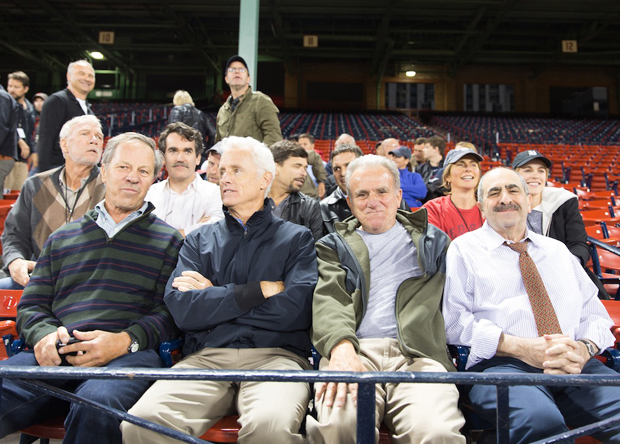 The journalists and actors during the shooting of “Spotlight.” Front row: Ben Bradlee Jr., John Slattery, Steve Kurkjian, Gene Amoroso. Back row: Walter Robinson, Brian d’Arcy James, Michael Rezendes, Mark Ruffalo, Sacha Pfeiffer, Rachel McAdams.
The journalists and actors during the shooting of “Spotlight.” Front row: Ben Bradlee Jr., John Slattery, Steve Kurkjian, Gene Amoroso. Back row: Walter Robinson, Brian d’Arcy James, Michael Rezendes, Mark Ruffalo, Sacha Pfeiffer, Rachel McAdams.Photo: Seacia Pavao/Open Road Films
This story, which centers of Rev. John Geoghan, was broken by the Boston Globe Spotlight team in 2002, and we worked on in from 2002 until 2003. I did dozens of stories as a member of the team and won my third Pulitzer Prize as a member of the team.
‐ I saw some articles about the film in the Russian press, and one of them was very interesting. It was claiming that the type of the journalism shown in the film can never take place in Russia because of its political regime and restriction on free press. Do you think that such investigative journalism is possible only in the United States with its rich traditions of free press?
‐ That’s a very thoughtful, interesting and complicated question. The team that I worked on here at the Boston Globe was established around the blue print of the team that was at the London Sunday Times. It was called the “Insight Team”.
It’s interesting that reporters are not better liked or appreciated by the public. On public opinion polls, whether here or anywhere, when they say “Do you like reporters? Do you like the media?” people they say “No, we don’t like them. They’re in our business, they’re poking their noses in our business”. In order for democracy to survive and thrive, it needs an informed public.
What investigative reporters like myself do is not just take the news that governments, businesses, or public officials give out in news releases. Those news releases only say the positive things that a government, or a business has done. As investigative reporters, we’re really getting our tips in news and ideas for stories from the common folk, from the people who work hard every day to raise their children, who pay their taxes and follow the laws. They don’t feel they can stop it just by speaking up themselves. They need someone or something with a bigger megaphone, with more power.
So what they do is they call the newspaper, and it’s nothing that is unique here in Boston, in the United States, or England, or in the West. It’s everywhere. That process thrives on a public that want to change their government because they feel it is not doing the right thing, so they depend on newspapers.
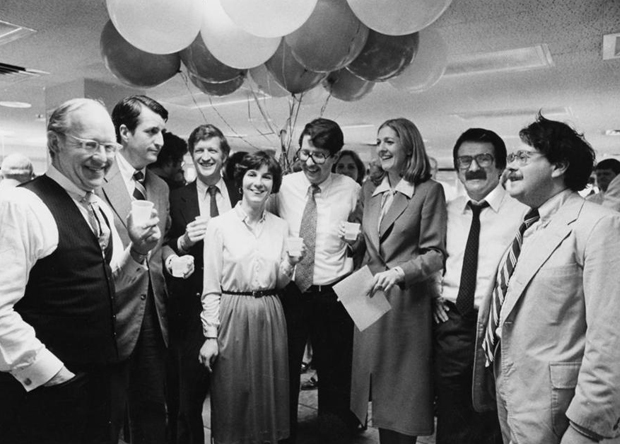 Thomas Winship, William Taylor, Sandy Hawes, Joan Venocchi, Nils Brazelius, Ellen Goodman, Stephen Kurkjian, and Bill Henry celebrate Pulitzer Prizes in 1980.
Thomas Winship, William Taylor, Sandy Hawes, Joan Venocchi, Nils Brazelius, Ellen Goodman, Stephen Kurkjian, and Bill Henry celebrate Pulitzer Prizes in 1980.Photo: Boston Globe
The second amendment to U.S. constitution says you can carry a gun, and American citizens can buy under regulations and possess a gun. That’s an important amendment those who founded the American government in the late 1700s felt that if a group of citizens can’t get their positions heard or heeded they should be allowed to pick up their guns and take power away from a repressive government. In fact, there have only been a very few occasions during our existence that people have had to take to the streets with guns to get their voices heard. Why? Why does that not happen? It’s because of the first amendment. The first amendment mandates freedom of the press, freedom of speech, and freedom to address government with your grievances. That’s a very important part of our basic operating principle here in the United States.
But underneath of those freedoms is this belief by all of us here that this government is not bigger than me and not bigger than my family. If I see something wrong, I can change it. I don’t know what goes on in Moscow or Russia, but from what I read, that sense of “I can change it” is missing, and I think the public has to use the press and the press has to speak up for its public, to be independent of the government.
In Armenia there are several organizations but particularly one I am familiar with that has done incredible reporting of the past fifteen years, and that’s HETQ.
‐ Yes, people are doing journalistic investigations in post‐Soviet space including Armenia, in particular Hetq, but the difference is that when they discover loud cases of corruption or fraud, in 99% of cases nothing takes place because law enforcement bodies are not opening investigation based on the published facts and evidence. So, what’s your advice to journalists in these countries?
‐ My advice is the same as it was to HETQ chief Edik Baghdasaryan when I met him in 2002, and that is ‐ just keep writing. Bad guys will not become good guys, and bad politicians will not become good politicians without your reporting. What has to be beneath that is the public. You have to get the public on your side believing that those articles, that coverage, that independence and that bravery in the end will change things slowly but certainly.
If the public gets cynical and just think “It’s not going to happen” in that negative sense, then you are not worth the coverage of the journalists out there. It’s your fault, Armenian citizens, it’s not the fault of the independent, brave, courageous reporters. There is always that Armenian sentiment, that “We can’t do anything”, “It’s all business as usual”, “Poor‐poor us”, nothing’s going to change with that attitude. You have to get involved, and I’m not talking taking to the streets, protesting, breaking windows. I’m talking of voting, taking charge, and I’m talking taking part in your neighbourhood, taking part in what’s going on in your community, your town.
We may not be able to change presidency, I understand that, but sooner or later the people who become politicians are going to recognize that society wants good government that is responsive to their needs. They want good health, good education, good jobs, good roads, and good environment. It may take us twenty years or another twenty years to drive that reality into the government’s mind, but once it’s there, it will never be removed. Our Bill of Rights was adopted in the late 1700s, and here we are 225 years later, and it’s a basic belief here, referenced by both progressives and conservatives. You’re not going to take away my freedom of speech and my freedom to vote, as I’m not going to take away your guns.
‐ You are working as a journalist for around 50 years and witnessed many changes in the profession during that time. What are the biggest gains and what are the biggest losses?
‐ The biggest loss is that people are not buying the paper or using the paper for an advertising medium as they used to. Until the internet became a driving force, if you wanted to buy a house or rent an apartment or get a job, you looked in the papers, in a classified section, and businesses or individuals would advertise for what they were selling.
We the papers were the medium, so people would read us and read for the advertising needs but also for our journalism. Our revenue has dropped dramatically. We still get a lot of readers to what we’re writing, but it’s on the internet. They read our articles on the internet. The problem is that the internet revenue, the advertising revenue is far less that the advertising revenue in the newspaper. In the end, it doesn’t seem to be yet as effective on the internet as the ad was in the newspaper. As the result of the paper’s not making as much money, you’re reducing your reporting staff. My newspaper’s editorial department had more than 500 employees. That’s not just reporters, but we had foreign bureaus, we had a very large Washington bureau. Today we reduced our Washington bureau and we have cut out our foreign coverage. We still use wire services for our foreign and Washington coverage, but it’s not as effective, our readers are not served as well by the wire services. They could live in Cincinnati or Oklahoma, or Los Angeles, and read the same wire service.
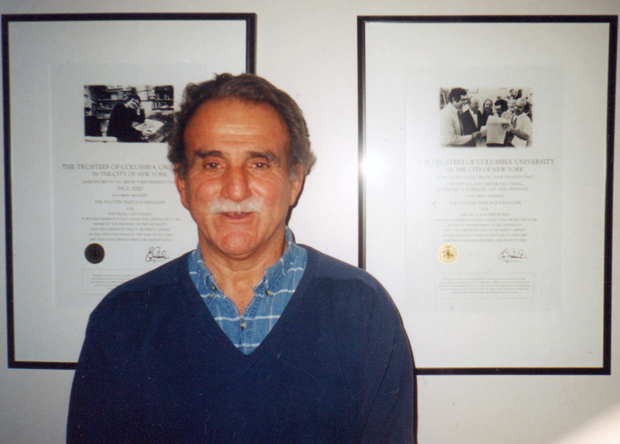 Stephen Kurkjian in 2001
Stephen Kurkjian in 2001Photo: Ara Tadevosyan
When you have a Globe reporter on scene, your readers are so better informed, because those readers are getting a “Boston idea” on what’s going on there. During the earthquake in 1988, we had a reporter in Moscow, David Filipov, who went down to Yerevan to cover. And even though other great papers, The Times and The Herald posted their reports, David’s article stood out because he was talking to people who had family in Boston or Massachusetts, and you just felt more attached or involved in the crisis when you know your kin or people whom you knew are living there.
But I’m very proud to say that investigative reporting is still very important. The Boston Globe still has a Spotlight team, they’re still doing long‐term investigative reporting, they’re still focused on the major issues of the community as they affect the citizens of the community.
‐ You are three times Pulitzer Prize winner ‐ what is your advice to young people who want to become a journalist?
‐ You’re not going to make the money you would make as a lawyer, as an engineer or as a businessperson, but put that aside. What being a journalist allows you to do is to be involved in people’s lives, and you are as important in their lives as the public officials and the police.
In fact, in some ways I think you’re more important, because the public officials and the police are tied to an organization that needs to whether by the truth or by the lie perpetuate itself. The newspaper doesn’t. Free and independent newspaper is always going to be there, so the reporter is not tied to any governmental organization or party, and the reporter is only influenced by the principles and the disciplines of the craft of journalism. And the craft of journalism mandates that you write thoroughly and fairly.
Thoroughly as to continue to ask questions, identify yourself and use the education, the expertise and the upbringing of who you are.
Being Armenian, or being an immigrant helps in that way, because you’re a fighter. You know unfairness, and unfairness bothers you. If you have all the money in the world, you’re not going to be a very good reporter because you’re not going to feel the unfairness that those who are victimized by major forces – tyranny, war, – feel, you’re not going to feel that. When you feel it, it forces you to be working harder, to tell that story as compellingly as possible, but you also have to be fair. Fairness is that you make sure that you get the story right, that what has happened is not the fault of one person or one party, and that you have to tell that other side. You can’t make good guys or bad guys. The world is far too grey, not black and white, it’s a lot more grey than that.
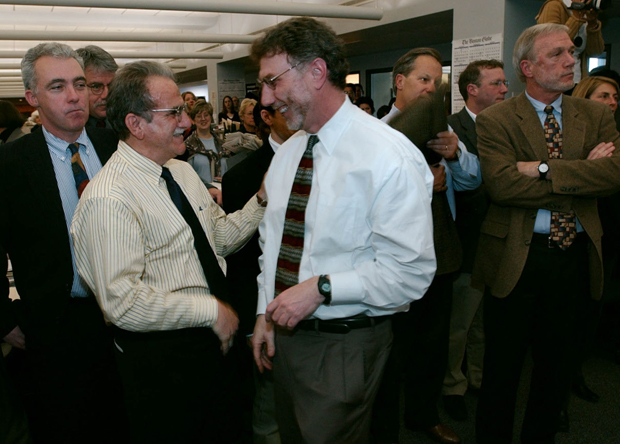 Boston Globe editor Marty Baron congratulates Stephen Kurkjian after the newspaper was awarded a Pulitzer Prize in Boston, Monday April 7, 2003.
Boston Globe editor Marty Baron congratulates Stephen Kurkjian after the newspaper was awarded a Pulitzer Prize in Boston, Monday April 7, 2003. Photo: Charles Krupa/AP
I think to be involved in that process all these years later for me is a life well lived, cause I have been involved in taking up the concerns and complaints and the grievances not of the top officials, not of the presidents and the heads of the parties, but of the little guy. The guy who is the little person, the person who’s bothered that their children are not getting the best treatment at their hospitals or not getting the best educated at their schools, or are being bullied on the streets because the police are not paying attention. That kind of work for me personally, as an individual, is so fulfilling and purposeful.
I do think that being an Armenian, growing up in an Armenian family here in the Boston Area, not having much money, living among lower middle class people and seeing how hard people work to put food on their table, to make sure their houses were clean and up maintained well, and most of all make sure that their kids were getting educated and were being protected, ‐ that goal was for me in the 50s and that goal is still here in my neighbourhood many years later. Different people, different ethnicities, where there once Armenians are now Asians, where there once Jews are now Caribbean, African or Hispanic, or new‐coming Irish, or Italian; it’s an immigrant neighbourhood, but they still buy into this belief that “I can provide for my family here in America better that my home where I was because of a government that protects the individual, and the press that will continue to make sure that the government stays focused on the individual”.
‐ You have written many articles on Armenian Genocide issue. Last year, we had Armenian Genocide Centennial and many people think that 2015 became a turning point where we start thinking about us, about our identity. What is the definition of Armenian for you? Should he speak Armenian or this is not necessary, should he be Christian?
‐ Let me just put this on the table: we do not speak the same language here in Watertown as you do in Yerevan. So it’s not the language, even though I feel such shame that I did not learn this beautiful language of my mother and father. How ridiculous that this man, who has people look up to as a successful Armenian American, cannot speak his native tongue. Amot! [“Shame” in Armenian]. If I live another hundred years, I am going to learn this language not just because of communicating with Armenian officialdom, but to be able to read Armenian of the 1800s, to read the original documents of the Church. That to me is culture, that to me shows my pride.
I know what being Armenian meant to me. For me, it meant a pride, a great pride in providing achievement for my family and my community and for my church, my larger family “ian” family, the Kurkjian‐Kasperian “ian” family. I was brought up American, I went to American law school. I knew what it meant to be Armenian, but it was something that burned inside me, it was all the slogans of being an Armenian: never lose your name, lose your arm before you lose your name, two Armenians together will start a new Armenia, ‐ all the wonderful things that Saroyan told us. They run true to me because they run true to me in my family and my house.
If I argued with my two sisters, my mother would put up her hand. “Five fingers,” she’d say. It meant that if two fingers or one finger were hurt, the hand is not working, for you have to work together. All those slogans are true and they exist in every family. That said, there is something else that is going to maintain our people over the next thousand years, and that is the pride of how we have survived. You see it in each other’s eyes and you see it in your churches.
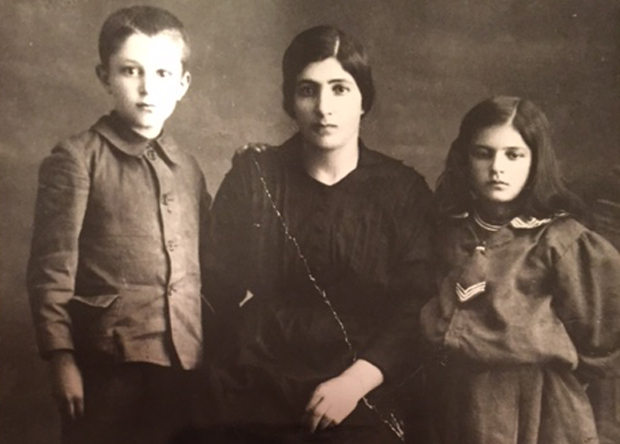 Stephen Kurkjian father, Anooshavan Kurkjian, circa 1920, with his mother Loosig Kurkjian and aunt Agnes Kurkjian.
Stephen Kurkjian father, Anooshavan Kurkjian, circa 1920, with his mother Loosig Kurkjian and aunt Agnes Kurkjian.Photo: S. Kurkjian’s archive
I’ve grown up to be an American even though I’m proud to be an Armenian, I’m full Armenian, my whole DNA is Armenian. My grandfather, whom I’m named after, was killed in the Genocide. I knew nothing of my history until I went back with my father, a survivor, he survived as a three‐year‐old to come to the United States. My father wanted to go back to see his village. He had never spoken of it. And I went back with him and another family who went to another city in historic Armenia, and I saw what my father’s community looked like. I saw nearby churches and what they looked like, and they looked like the churches in Watertown Square. They were crumbling, but still there was art, there was crucifix, there was the Armenian khachkar, there were paintings. I looked and I saw, and it struck me what an incredible people we are.
It struck me ‐ “That’s me! That’s the greatest thing about me‐ my Armenianess, and if you have one drop of it? My father had a drop of genius and he was an incredible artist. It did not pass to anybody in the family, that one drop of genius, but what did pass on to us is our heritage. It doesn’t matter whether they were 1/5, 1/10, 1/100 Armenian. You are Armenian because you have it in your blood and you have it in your history, and it’s a true history. When two Armenians get together, you look for the commonality. You don’t look for business. You look for “Where did you go to church? Where did you go to Armenian school? Where did your family summer? Have you ever gone back? What village did you come from? What happened to your great grandfather?”
There’s a movement in Turkey now to find the roots of the Islamized Armenians, but why? Why? It’s not to get our money, it’s not to get our business. It’s to be able to understand what makes us survivors, and that is the honesty, the good will, the good nature, the hard work and the drive for education. What we bring to the table in our history and ourselves is a wonderful mix that we all should be proud of. I think it’s that recognition and that understanding, that pride that will ensure Armenians’ surviving. Whether there’s two million or ten million from Artsakh, Yerevan, it doesn’t matter, there will always be Armenians in the world. As long as we know our history and we have our centre, which is Yerevan.
P.S. Stephen Kurkjian's “Master Thieves: The Boston Gangsters Who Pulled Off the World’s Greatest Art Heist” book was publsihed in March, 2015. The book is about the largest art theft in history that happened at Boston Isabella Stewart Gardner Museum. Stephen Kurkjian who was the principal reporter on the case for The Boston Globe for years, has written a gripping account of the still-unsolved heist of a quarter century ago. For more information about the book you can visit author’s website.
Ara Tadevosyan talked to Stephen Kurkjian








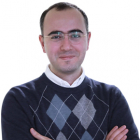
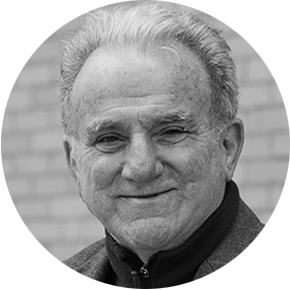











Comments
Dear visitors, You can place your opinion on the material using your Facebook account. Please, be polite and follow our simple rules: you are not allowed to make off - topic comments, place advertisements, use abusive and filthy language. The editorial staff reserves the right to moderate and delete comments in case of breach of the rules.